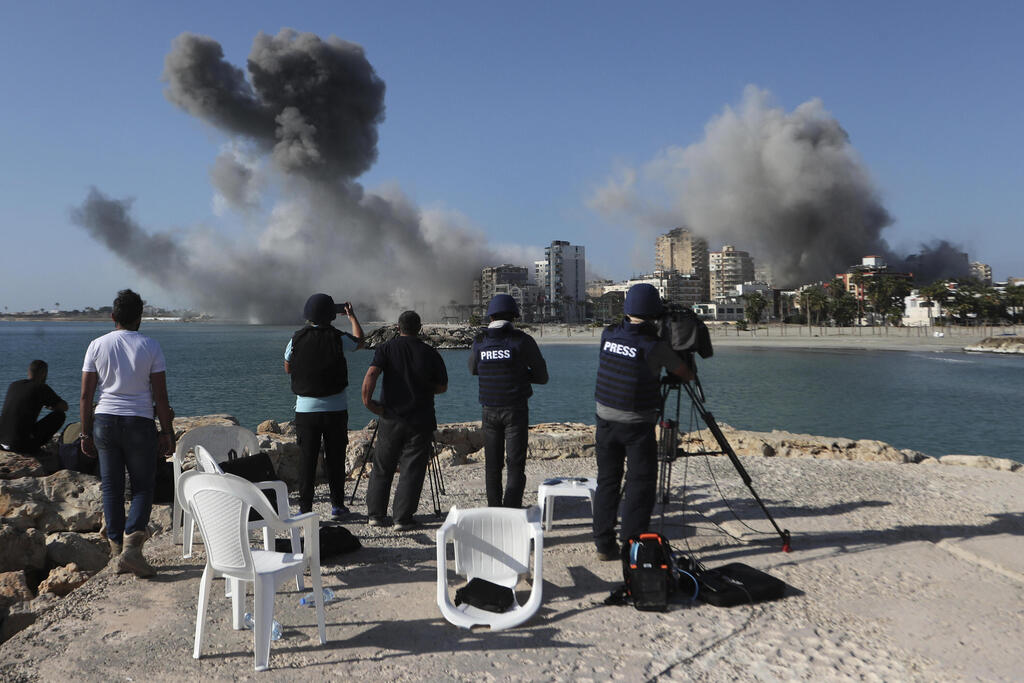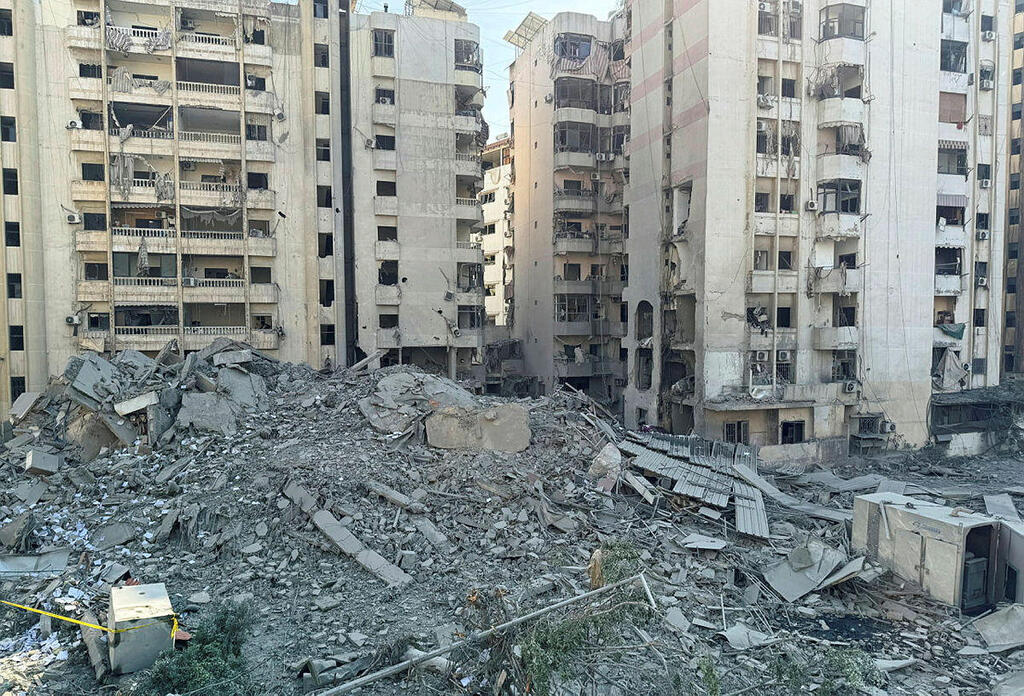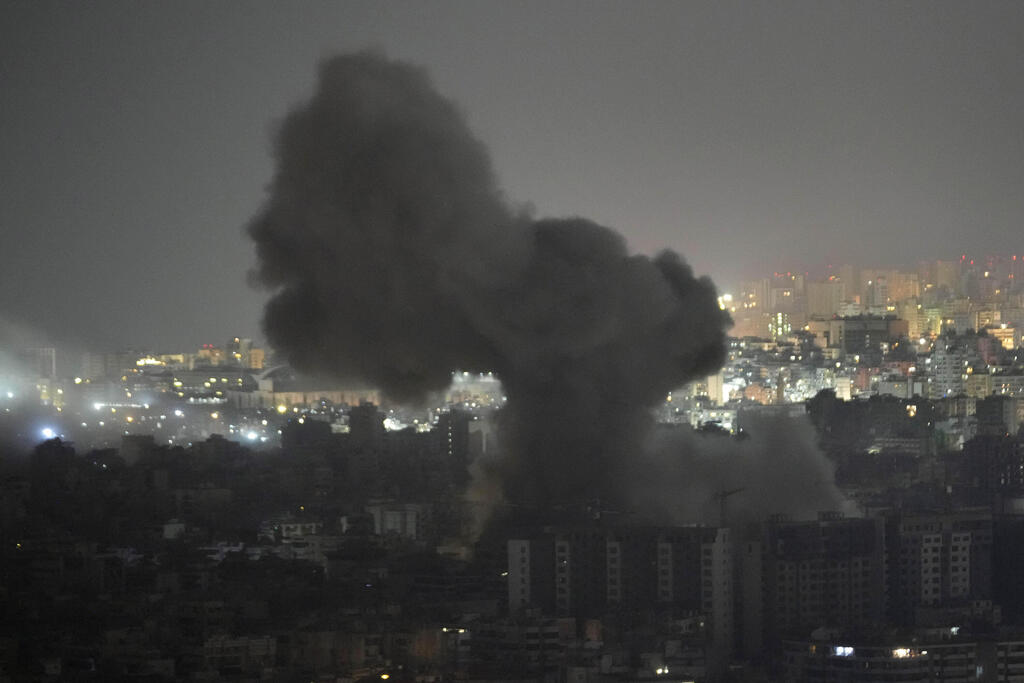Getting your Trinity Audio player ready...
At the end of September, just days after Hezbollah leader Hassan Nasrallah was eliminated in an airstrike on the organization's stronghold in southern Beirut, a reporter from "The Atlantic" magazine met with a Hezbollah supporter at a seaside café in western Beirut. The man, an academic with a thin white beard and the weary appearance of someone who hadn't slept in days, had a deep and long-standing connection with Hezbollah.
4 View gallery


A man protesting against Israel, shows picture of Nasrallah
(Photo: AP / Hassan Ammar)
"We are in a great campaign, like no other before," he said. "Hezbollah has never faced what Israel is conducting now, not in 1982, not in 2006. This is a total war." When asked about the possibility of Iran stopping its support for the organization, he replied after a tense silence: "There are questions." He added, "It's like you've raised a son, now 42 years old, and you abandon him? No. It doesn't make sense."
Fighters at the border are ready, he said, and Israeli soldiers will dig their own graves and soon beg for a cease-fire. But then, the man slowed his speech, the reporter describes, and doubts returned. He mentioned Ahmad Shukeiri, the first chairman of the PLO, who said on the eve of the Six-Day War that the Jews who survive will remain in Palestine, but he estimated that none of them would survive.
"I don't want to be like him," said the man. It took a moment to understand the historical analogy: he implied that the movement he is so dedicated to might face complete destruction. "This tea we are drinking," he said, "we don't know if it will be the last."
In a comprehensive article in "The Atlantic," reporter Robert Worth paints a picture of a fragmented country, and perhaps something Israelis would like to hear - that Hezbollah and Iran are losing their grip on it. The article's headline is a quote about "the end of the Iranian era." Here are selected excerpts from it.
Fuel ran out, so they continued on foot
Hezbollah is much more than a militia, writes Worth; it is almost a state within a state, stronger than the weak and divided Lebanese government, certainly stronger than the Lebanese army. The organization smuggles not only weapons but billions of dollars from Iran. It operates banks, hospitals, a welfare system and a parallel economy of duty-free imports and drug trade that enriched and empowered the Shiite community, which was previously disadvantaged.
The road to Tyre reveals the depth of the crisis, according to the article in "The Atlantic." The coastal highway, usually bustling with traffic, is almost empty. The driver speeds at over 87 mph. On both sides of the road, smoke from the previous night's bombings can be seen. Hezbollah's yellow flags wave in the wind, alongside new billboards of "martyrs" with the inscription "Nasrallah Aat" - a play on words in Arabic on the name of the killed leader of Hezbollah, meaning "Victory of God." On the northern roadside, dozens of abandoned cars are parked -left behind by families who fled from the south, ran out of fuel, and continued on foot.
The city of Tyre, usually bustling, is described by the reporter as a ghost town. The Rest House hotel, a fenced tourist complex, has become a safe spot for refugees and journalists. From its wide balcony, overlooking a stunning beach, one can see Hezbollah's rocket launches. "It happens a lot," said one Arab journalist. "That's how it is in war. You get used to it until the assumptions change and the missiles land on you."
In the city of Sidon, a strike on a residential building claimed the lives of at least 45 people, according to the Lebanese Ministry of Health. Israel, the article notes, stated that it eliminated a local Hezbollah commander and with him activists. Mohammed Ahmed Jiradi, 31, was among the first to arrive at the scene. "I heard the screams of people under the rubble," he recounted. "I saw my aunt when they rescued her. Her internal parts were outside, her head crushed. That's the last image I have of her."
A resident named Lilal recounted how many receive phone calls from Israelis warning them to evacuate their homes. Many follow the X account of Avichay Adraee, the IDF spokesperson in Arabic, who publishes warnings about upcoming attacks. Lilal's neighbor, Ghadir, received a call from someone speaking Arabic with a Palestinian accent who knew all her personal details. When she evacuated her apartment, the building was bombed that night.
An economic crisis is an opportunity for Israeli intelligence.
In an effort to improve its image, Hezbollah organized a tour for about 300 journalists in the devastated areas of Dahiya, its stronghold in southern Beirut. The reporter describes how, at each bombing site, a Hezbollah representative gave a speech about innocent civilians who were killed while journalists crowded to photograph the smoking ruins. One shop owner in the area sneaked in to check his place and told the reporter, "I came now because I know the Israelis won't bomb you."
The reporter shares the story of Hamoudi, a 25-year-old Shia who was a secular and successful film producer in Beirut. "He didn't pray," his sister said. "My mother said, 'You won't be a martyr, you don't pray.'" Hamoudi loved women, music and parties, and lived in the secular Hamra district instead of Hezbollah's stronghold in Dahieh. Last September, he decided to join the ranks of the militants. A day after filming a "martyr" video, he was killed in an Israeli bombing. "He was my friend, my brother, my box of secrets," his sister said tearfully. Instead of promising revenge, she added, "I'm thinking of leaving the country."
Ashraf Rifi, former head of Lebanese security services, explained to The Atlantic how Israel managed to infiltrate Hezbollah's ranks. According to him, the organization's involvement in the Syrian war exposed the fighters to Israeli intelligence. Additionally, Lebanon's economic crisis made many vulnerable to recruitment as collaborators. On September 17, an operation was carried out to explode thousands of beepers sold through deception.
A doctor at a leading hospital described the chaos of that day, with dozens of young people hospitalized without registering their names – all under the name "George," a typical Christian name. Rifi estimated that about 20% of Hezbollah's mid-level and senior commanders were killed in Israeli operations. "The Iranian era is over, I think," he said. "In Lebanon, Syria, Iraq, Yemen."
Belief in Lebanon
In Tripoli, at the trendy Crop restaurant, the reporter described a heated debate about the country's future. A local municipal official claimed, "I don't see anyone who believes in a country called Lebanon. I see the Christians, Sunnis, Shias, Druze each loyal to their community or party. There is no public interest." A young historian named Charles El-Haik passionately disagreed, arguing that Lebanon has unique characteristics that distinguish it from other Arab countries: traditions of religious diversity, democracy, higher education, and personal and public freedoms.
A senior former officer in the Lebanese army, close to Chief of Staff Joseph Aoun, warned in the article that "only Iran can disarm Hezbollah." According to him, despite the severe blow, Hezbollah still has a significant fighting force in the south that can operate independently. "But over time," he emphasized, "Hezbollah will feel the lack of money. That will be the biggest problem. And when the Shias return to the south, who will rebuild?"
At night, from the roof of a hotel in Beirut, the reporter describes orange flames erupting from the southern outskirts of the city following an airstrike. "It looks like a volcanic eruption," he writes. A group of young Lebanese at a nearby table film the spectacle on their phones and return to their cocktails.
Meanwhile, about a quarter of Lebanon's population has been displaced. At Beirut airport, Worth writes that he saw people sleeping outside hoping to get a ticket for a flight out. Foreign airlines have stopped their flights, and more than 300,000 Syrian refugees have fled back to Syria – evidence, he says, of the depth of fear prevailing in the country.
Get the Ynetnews app on your smartphone:




